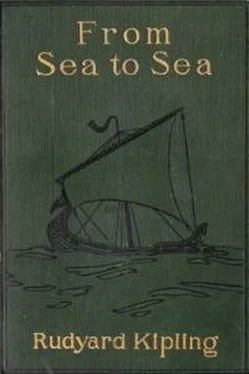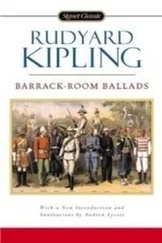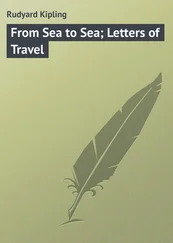Джозеф Киплинг - From Sea to Sea
Здесь есть возможность читать онлайн «Джозеф Киплинг - From Sea to Sea» весь текст электронной книги совершенно бесплатно (целиком полную версию без сокращений). В некоторых случаях можно слушать аудио, скачать через торрент в формате fb2 и присутствует краткое содержание. Год выпуска: 2014, Издательство: epubBooks Classics, Жанр: Биографии и Мемуары, Публицистика, на английском языке. Описание произведения, (предисловие) а так же отзывы посетителей доступны на портале библиотеки ЛибКат.
- Название:From Sea to Sea
- Автор:
- Издательство:epubBooks Classics
- Жанр:
- Год:2014
- ISBN:нет данных
- Рейтинг книги:3 / 5. Голосов: 1
-
Избранное:Добавить в избранное
- Отзывы:
-
Ваша оценка:
- 60
- 1
- 2
- 3
- 4
- 5
From Sea to Sea: краткое содержание, описание и аннотация
Предлагаем к чтению аннотацию, описание, краткое содержание или предисловие (зависит от того, что написал сам автор книги «From Sea to Sea»). Если вы не нашли необходимую информацию о книге — напишите в комментариях, мы постараемся отыскать её.
From Sea to Sea — читать онлайн бесплатно полную книгу (весь текст) целиком
Ниже представлен текст книги, разбитый по страницам. Система сохранения места последней прочитанной страницы, позволяет с удобством читать онлайн бесплатно книгу «From Sea to Sea», без необходимости каждый раз заново искать на чём Вы остановились. Поставьте закладку, и сможете в любой момент перейти на страницу, на которой закончили чтение.
Интервал:
Закладка:
Giridih is perfectly mad—quite insane! Geologically, "the country is in the metamorphic higher grounds that rise out of the alluvial flats of Lower Bengal between the Osri and the Barakar rivers." Translated, this sentence means that you can twist your ankle on pieces of pure white, pinky, and yellowish granite, slip over weather–worn sandstone, grievously cut your boots over flakes of trap, and throw hornblende pebbles at the dogs. Never was such a place for stone–throwing as Giridih. The general aspect of the country is falsely park–like, because it swells and sinks in a score of grass–covered undulations, and is adorned with plantation–like jungle. There are low hills on every side, and twelve miles away bearing south the blue bulk of the holy hill of Parasnath, greatest of the Jain Tirthankars, overlooks the world. In Bengal they consider four thousand five hundred feet good enough for a Dagshai or Kasauli, and once upon a time they tried to put troops on Parasnath. There was a scarcity of water, and Thomas of those days found the silence and seclusion prey upon his spirits. Since twenty years, therefore, Parasnath has been abandoned by Her Majesty's Army.
As to Giridih itself, the last few miles of train bring up the reek of the "Black Country." Memory depends on smell. A noseless man is devoid of sentiment, just as a noseless woman, in this country, must be devoid of honour. That first breath of the coal should be the breath of the murky, clouded tract between Yeadon and Dale—or Barnsley, rough and hospitable Barnsley—or Dewsbury and Batley and the Derby Canal on a Sunday afternoon when the wheels are still and the young men and maidens walk stolidly in pairs. Unfortunately, it is nothing more than Giridih—seven thousand miles away from Home and blessed with a warm and genial sunshine, soon to turn into something very much worse. The insanity of the place is visible at the station door. A G. B. T. cart once married a bathing–machine, and they called the child tum–tum . You who in flannel and Cawnpore harness drive bamboo–carts about up–country roads, remember that a Giridih tum–tum is painfully pushed by four men, and must be entered crawling on all–fours, head first. So strange are the ways of Bengal!
They drive mad horses in Giridih—animals that become hysterical as soon as the dusk falls and the countryside blazes with the fires of the great coke ovens. If you expostulate tearfully, they produce another horse, a raw, red fiend whose ear has to be screwed round and round, and round and round, before she will by any manner of means consent to start. The roads carry neat little eighteen–inch trenches at their sides, admirably adapted to hold the flying wheel. Skirling about this savage land in the dark, the white population beguile the time by rapturously recounting past accidents, insisting throughout on the super–equine "steadiness" of their cattle. Deep and broad and wide is their jovial hospitality; but somebody—the Tirhoot planters for choice—ought to start a mission to teach the men of Giridih what to drive. They know how , or they would be severally and separately and many times dead, but they do not, they do not indeed, know that animals who stand on one hind leg and beckon with all the rest, or try to pigstick in harness, are not trap–horses worthy of endearing names, but things to be pole–axed. Their feelings are hurt when you say this. "Sit tight," say the men of Giridih; "we're insured! We can't be hurt."
And now with grey hairs, dry mouth, and chattering teeth to the collieries. The E. I. R. estate, bought or leased in perpetuity from the Serampore Raja, may be about four miles long and between one and two miles across. It is in two pieces, the Serampore field being separated from the Karharbari (or Kurhurballi or Kabarbari) field by the property of the Bengal Coal Company. The Raneegunge Coal Association lies to the east of all other workings. So we have three companies at work on about eleven square miles of land.
There is no such thing as getting a full view of the whole place. A short walk over a grassy down gives on to an outcrop of very dirty sandstone, which in the excessive innocence of his heart the visitor naturally takes to be the coal lying neatly on the surface. Up to this sandstone the path seems to be made of crushed sugar, so white and shiny is the quartz. Over the brow of the down comes in sight the old familiar pit–head wheel, spinning for the dear life, and the eye loses itself in a maze of pumping sheds, red–tiled, mud–walled miners' huts, dotted all over the landscape, and railway lines that run on every kind of gradient. There are lines that dip into valleys and disappear round the shoulders of slopes, and lines that career on the tops of rises and disappear over the brow of the slopes. Along these lines whistle and pant metre–gauge engines, some with trucks at their tail, and others rattling back to the pit–bank with the absurd air of a boy late for school that an unemployed engine always assumes. There are six engines in all, and as it is easiest to walk along the lines one sees a good deal of them. They bear not altogether unfamiliar names. Here, for instance, passes the "Cockburn" whistling down a grade with thirty tons of coal at her heels; while the "Whitly" and the "Olpherts" are waiting for their complement of trucks. Now a Mr. T. F. Cockburn was superintendent of these mines nearly thirty years ago, in the days before the chord–lines from Kanu to Luckeeserai were built, and all the coal was carted to the latter place; and surely Mr. Olpherts was an engineer who helped to think out a new sleeper. What may these things mean?
"Apotheosis of the Manager," is the reply. "Christen the engines after the managers. You'll find Cockburn, Dunn, Whitly, Abbott, Olpherts, and Saise, knocking about the place. Sounds funny, doesn't it? Doesn't sound so funny, when one of these idiots does his best to derail Saise, though, by putting a line down anyhow. Look at that line! Laid out in knots—by Jove!" To the unprofessional eye the rails seem all correct; but there must be something wrong, because "one of those idiots" is asked why in the name of all he considers sacred he does not ram the ballast properly.
"What would happen if you threw an engine off the line?" "Can't say that I know exactly. You see, our business is to keep them on , and we do that. Here's rather a curiosity. You see that pointsman! They say he's an old mutineer, and when he relaxes he boasts of the Sahibs he has killed. He's glad enough to eat the Company's salt now." Such a withered old face was the face of the pointsman at No. 11 point! The information suggested a host of questions, and the answers were these: "You won't be able to understand till you've been down into a mine. We work our men in two ways: some by direct payment—under our own hand, and some by contractors. The contractor undertakes to deliver us the coal, supplying his own men, tools, and props. He's responsible for the safety of his men, and of course the Company knows and sees his work. Just fancy, among these five thousand people, what sort of effect the news of an accident would produce! It would go all through the Sonthal Parganas. We have any amount of Sonthals besides Mahometans and Hindus of every possible caste, down to those Musahers who eat pig. They don't require much administering in the civilian sense of the word. On Sundays, as a rule, if any man has had his daughter eloped with, or anything of that kind, he generally comes up to the manager's bungalow to get the matter put straight. If a man is disabled through accident he knows that as long as he's in the hospital he gets full wages, and the Company pays for the food of any of his women–folk who come to look after him. One , of course; not the whole clan. That makes our service popular with the people. Don't you believe that a native is a fool. You can train him to everything except responsibility. There's a rule in the workings that if there is any dangerous work—we haven't choke–damp; I will show you when we get down—no gang must work without an Englishman to look after them. A native wouldn't be wise enough to understand what the danger was, or where it came in. Even if he did, he'd shirk the responsibility. We can't afford to risk a single life. All our output is just as much as the Company want—about a thousand tons per working day. Three hundred thousand in the year. We could turn out more? Yes—a little. Well, yes, twice as much. I won't go on, because you wouldn't believe me. There's the coal under us, and we work it at any depth from following up an outcrop down to six hundred feet. That is our deepest shaft. We have no necessity to go deeper. At home the mines are sometimes fifteen hundred feet down. Well, the thickness of this coal here varies from anything you please to anything you please. There's enough of it to last your time and one or two hundred years longer. Perhaps even longer than that. Look at that stuff. That's big coal from the pit."
Читать дальшеИнтервал:
Закладка:
Похожие книги на «From Sea to Sea»
Представляем Вашему вниманию похожие книги на «From Sea to Sea» списком для выбора. Мы отобрали схожую по названию и смыслу литературу в надежде предоставить читателям больше вариантов отыскать новые, интересные, ещё непрочитанные произведения.
Обсуждение, отзывы о книге «From Sea to Sea» и просто собственные мнения читателей. Оставьте ваши комментарии, напишите, что Вы думаете о произведении, его смысле или главных героях. Укажите что конкретно понравилось, а что нет, и почему Вы так считаете.












